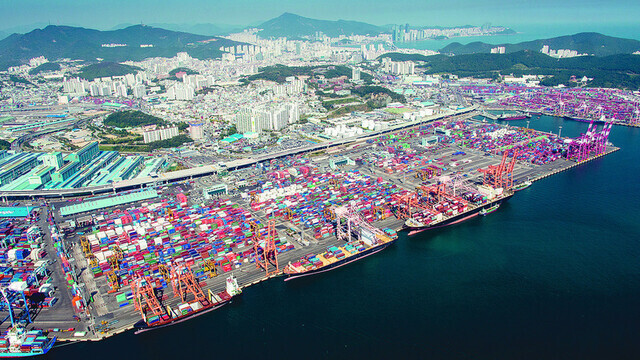hankyoreh
Links to other country sites 다른 나라 사이트 링크
S. Korea ranks higher than Japan in credit rating, economic competitiveness, report says

The World Competitiveness Rating — calculated by Switzerland’s International Institute for Management Development — was the most comprehensive and symbolic indicator included by the Federation of Korean Industries (FKI) Thursday in its data comparing changes in the economic and competitiveness gap between South Korea and Japan over the roughly three decades since the early 1990s.
The figures, released by FKI ahead of the National Liberation Day holiday on Sunday, showed that between 1995 and 2020, Japan slid from 4th place to 34th on the World Competitiveness Ranking, while South Korea nosed ahead of it with a climb from 26th to 23rd place.
In addition to that ranking, an equally dramatic change was seen in the national credit ratings assigned by international credit rating institutions such as S&P, Moody’s, and Fitch.
In 1990, S&P assigned South Korea an A+ rating, four levels below Japan’s AAA. By 2021, South Korea was given an AA rating, two levels higher than Japan’s A+.
In terms of current per capita gross domestic product (GDP) based on purchasing power parity — a measure of national purchasing power that reflects a country’s inflation and exchange rate levels — South Korea has been widening the gap since passing Japan in 2018 by a margin of US$43,001 to US$42,725.
South Korea was also found to have surpassed Japan in the competitiveness of its manufacturing, a representative industry on both sides.
The competitive industrial performance index ranking assigned by the UN Industrial Development Organization based on analysis of different countries’ manufacturing competitiveness showed a turnaround between 1990 when South Korea and Japan respectively placed 17th and 2nd, and 2018, when they placed 3rd and 5th.
Another notable change was a substantial narrowing of the gap between them in aggregate macroeconomic indicators.
In terms of nominal GDP, South Korea’s competitiveness grew from US$283 billion in 1990 to US$1.631 trillion in 2020, rising from the equivalent of 8.9% of Japan’s to 32.3%. In 1990, South Korea’s nominal GDP ranked 17th in the world, while Japan’s ranked 2nd; by 2020, South Korea was up to 10th and Japan had slid to 3rd.
Between 1990 and 2020, South Korea’s nominal per capita GDP jumped from US$6,610, or 25.5% of Japan’s level, to US$31,497, or 78.5% of Japan’s level.
South Korea’s strides were also evident in external sector indicators.
As of 2020, South Korea recorded US$513 billion in exports and US$468 billion imports, or 80% and 74% of the respective totals for Japan. The gap was much smaller than in 1990, when South Korea was calculated at 24% and 31% of Japan’s respective totals.
Even as the overall gap between the two sides showed signs of shrinking, Japan is still rated as clearly dominant in basic technology areas. South Korea’s trade deficit with Japan in materials and components nearly doubled from US$8.3 billion to US$15.4 billion between 1994 and 2020, and the two areas also rose from 70% and 73% as a percentage of the overall balance of trade with Japan over the same period.
Along the same lines, Japan has produced 24 Nobel laureates in science, which is seen as an indicator of competitiveness in basic science and source technology.
“While we saw the South Korea-Japan gap narrowing for most major economic indicators, and even reversing in some areas, there are still gaps in terms of investment and competitiveness in basic science and technology areas,” said Kim Bong-man, director of the FKI international affairs department.
“We need to build our competitiveness in science and technology, and we need proactive, long-term R&D [research and development] support to achieve that,” he added.
By Kim Young-bae, staff reporter
Please direct comments or questions to [english@hani.co.kr]

Editorial・opinion
![[Column] Season 2 of special prosecutor probe may be coming to Korea soon [Column] Season 2 of special prosecutor probe may be coming to Korea soon](https://flexible.img.hani.co.kr/flexible/normal/500/300/imgdb/original/2024/0426/3317141030699447.jpg) [Column] Season 2 of special prosecutor probe may be coming to Korea soon
[Column] Season 2 of special prosecutor probe may be coming to Korea soon![[Column] Park Geun-hye déjà vu in Yoon Suk-yeol [Column] Park Geun-hye déjà vu in Yoon Suk-yeol](https://flexible.img.hani.co.kr/flexible/normal/500/300/imgdb/original/2024/0424/651713945113788.jpg) [Column] Park Geun-hye déjà vu in Yoon Suk-yeol
[Column] Park Geun-hye déjà vu in Yoon Suk-yeol- [Editorial] New weight of N. Korea’s nuclear threats makes dialogue all the more urgent
- [Guest essay] The real reason Korea’s new right wants to dub Rhee a founding father
- [Column] ‘Choson’: Is it time we start referring to N. Korea in its own terms?
- [Editorial] Japan’s rewriting of history with Korea has gone too far
- [Column] The president’s questionable capacity for dialogue
- [Column] Are chaebol firms just pizza pies for families to divvy up as they please?
- [Column] Has Korea, too, crossed the Rubicon on China?
- [Correspondent’s column] In Japan’s alliance with US, echoes of its past alliances with UK
Most viewed articles
- 1‘We must say no’: Seoul defense chief on Korean, USFK involvement in hypothetical Taiwan crisis
- 2N. Korean delegation’s trip to Iran shows how Pyongyang is leveraging ties with Moscow
- 3‘Weddingflation’ breaks the bank for Korean couples-to-be
- 4Korea sees more deaths than births for 52nd consecutive month in February
- 5[Editorial] New weight of N. Korea’s nuclear threats makes dialogue all the more urgent
- 6[Column] Park Geun-hye déjà vu in Yoon Suk-yeol
- 7[Column] Has Korea, too, crossed the Rubicon on China?
- 8[Guest essay] The real reason Korea’s new right wants to dub Rhee a founding father
- 9Will NewJeans end up collateral damage in internal feud at K-pop juggernaut Hybe?
- 10Why Korea shouldn’t welcome Japan’s newly beefed up defense cooperation with US